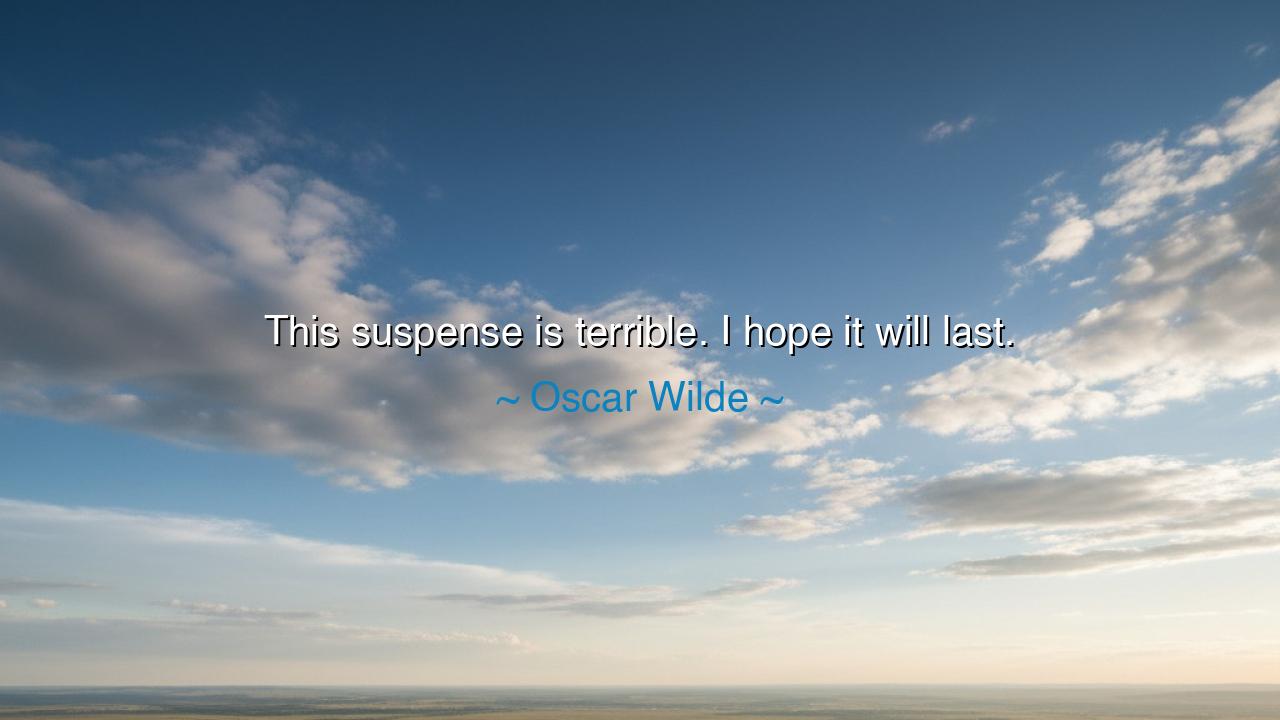
This suspense is terrible. I hope it will last.






In the dazzling salons of Victorian England, where wit was worshipped and words were weapons, Oscar Wilde reigned supreme — a poet, playwright, and philosopher disguised as a jester. Among his many immortal utterances, none glimmers quite like the paradoxical gem: “This suspense is terrible. I hope it will last.” At first, it seems a contradiction — how can one hope for the endurance of suffering, for the prolonging of agony? Yet in this playful irony, Wilde captures a profound truth of the human spirit: that life’s most vivid moments are born not in certainty, but in the tension of the unknown. Suspense, terrible though it may feel, is the pulse of existence itself — the proof that we are alive, waiting, trembling before the unfolding mystery of fate.
The origin of this line lies in Wilde’s celebrated play The Importance of Being Earnest, a masterpiece of wit and inversion that mocked the pretenses of polite society. Spoken by the character Gwendolen Fairfax, it is at once humorous and revealing — a portrait of the age’s obsession with sensation, with the drama of experience. Yet Wilde, ever the philosopher beneath the mask of laughter, uses the jest to illuminate something timeless. He knew that modern man — polished, civilized, restless — craved not peace, but passion; not stillness, but suspense. For it is in the waiting, not the resolution, that life’s energy burns brightest. Suspense is desire suspended — and desire, Wilde knew, is the essence of being.
To long for the end of suspense is to long for stillness — and stillness, though comforting, is also the shadow of death. Wilde, who lived his life in pursuit of beauty, knew that every great joy contains the ache of uncertainty. The artist waiting for inspiration, the lover for a letter, the seeker for revelation — all dwell within this “terrible suspense.” And yet, it is there, in that ache, that life expands. To hope that it will last is not madness; it is the recognition that the ache itself is sacred. For when suspense ends, so too does wonder. The human heart thrives not on conclusion, but on expectation, for expectation is the child of hope.
The ancients understood this in their own way. Consider Odysseus, wandering far from home, yearning for Ithaca. The suspense of his journey — each storm, each delay, each uncertain dawn — was both his torment and his glory. His tale would have no greatness if his voyage were swift. Likewise, Wilde’s paradox reminds us that to live fully is to dwell in the in-between, where joy and fear are intertwined. It is the space of becoming, the tension between what is and what might be. The suspense may be terrible — but it is also the birthplace of transformation.
Wilde himself knew this truth not only in art, but in life. In his final years, when fame turned to infamy and laughter to exile, he lived within the cruelest suspense — waiting for forgiveness, for meaning, for the world’s memory to soften. And yet, even then, his spirit refused despair. He found beauty in pain, poetry in downfall, humor in tragedy. Through his suffering, he proved that the terrible suspense of life — the uncertainty, the longing, the unfinished nature of all things — can be borne with grace, even with irony. For those who see deeply, suspense itself becomes art: the endless unfolding of the self against the horizon of the unknown.
There is a lesson in Wilde’s laughter, hidden beneath its glitter. We, too, live in an age of impatience — an age that fears waiting, that rushes to conclusion, that mistakes closure for peace. But to the wise, Wilde’s paradox speaks as counsel: do not flee suspense; embrace it. When life feels uncertain, when your path is veiled, when outcomes hang trembling in the balance — do not curse the waiting. For in that tension, the soul grows strong. It is in suspense that faith takes root, that imagination awakens, that love deepens. The terrible feeling you wish to escape may, in truth, be your moment of becoming.
Therefore, O seeker of meaning, take Wilde’s jest as a kind of prayer. When suspense grips your heart — when you do not know what comes next — smile as he did, and whisper, “I hope it will last.” For in that whisper lies courage: the courage to live without guarantees, to find delight even in doubt, to dance within the storm rather than longing for calm. Remember that every masterpiece, every victory, every transformation was born first in suspense. The cocoon trembles before the butterfly emerges. The heart beats hardest before love is declared. Life itself is the most terrible, and the most beautiful, suspense of all.
So laugh with Wilde, and learn from him. “This suspense is terrible. I hope it will last.” It is the jest of a man who saw that joy and fear are woven from the same thread, that to live vividly is to live uncertainly. Cherish the waiting, for it is the soul’s greatest proof that it still hopes, still dreams, still burns with the light of possibility. And when that suspense ends, as all things do, may you have lived it so fully that you look back and say — the terrible was wonderful after all.






AAdministratorAdministrator
Welcome, honored guests. Please leave a comment, we will respond soon